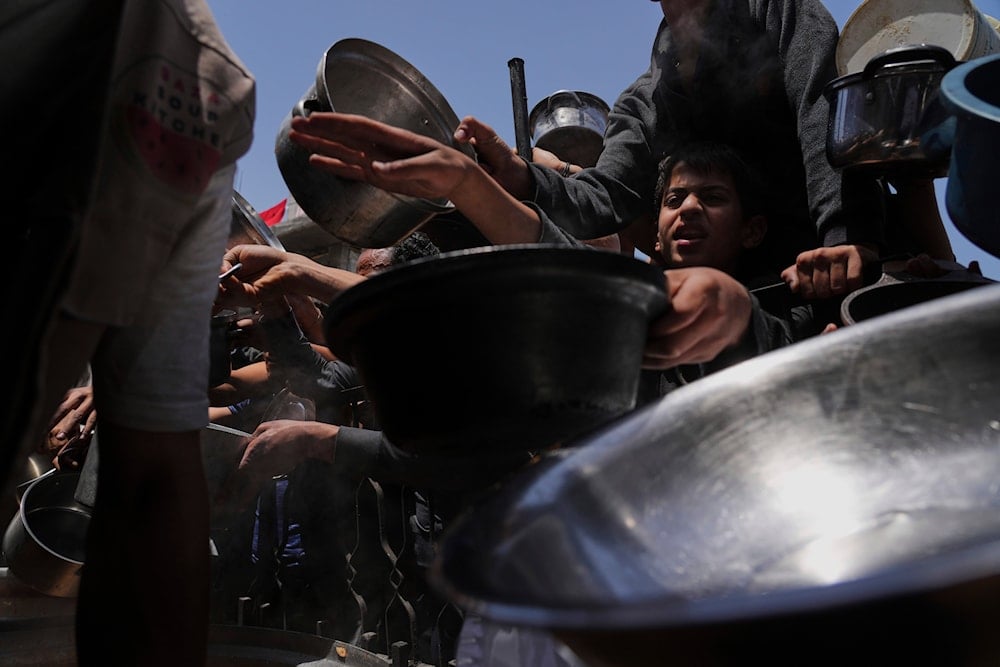'Israel' plans to control Gaza humanitarian aid amid UN rejection: WP
"Israel" is advancing a plan to control aid distribution in Gaza using private US security contractors, drawing condemnation from the UN and aid groups over legal and humanitarian concerns.
-

Palestinian children struggle to get donated food at a community kitchen in Beit Lahia, northern Gaza Strip, on May 3, 2025. (AP Photo/Jehad Alshrafi)
"Israel" is preparing to take control of humanitarian aid distribution in Gaza through a controversial new plan involving private US security contractors, the Washington Post (WP) reported on Sunday, adding that the move is being considered as a condition for lifting its two-month blockade on supplies into the besieged enclave, according to current and former Israeli officials, aid workers, and individuals familiar with the proposal.
The WP stressed that the plan is expected to be finalized during a meeting of the Israeli security cabinet on Sunday and could be implemented before the end of the month, potentially coinciding with a visit to the region by US President Donald Trump.
Under the proposal, approximately 60 trucks per day, just 10% of what was allowed during the earlier ceasefire, would be allowed to enter Gaza through the Karem Abu Salem crossing. Once inside, the aid would be delivered to six designated distribution hubs in southern Gaza under the protection of US private security contractors, according to WP. Under the agreed-upon procedure, aid would be distributed by nongovernmental humanitarian workers, with security firms managing perimeter control.
According to the report, facial recognition technology would be used to identify recipients, and each household would receive a parcel of food and hygiene items every one to two weeks. Each hub is expected to serve between 5,000 and 6,000 households.
Private contractors to secure distribution hubs
In the details, the report states that two US-based firms, Safe Reach Solutions (SRS) and UG Solutions, have reportedly been contracted for the operation. SRS, led by former CIA officer Phil Reilly, is responsible for logistics and planning. Security operations will be managed by UG Solutions, led by former US Green Beret Jameson Govoni. Both firms were active in Gaza during the recent ceasefire.
According to WP, the contractors will be armed but will not have detention authority. Funding for this effort is reportedly being channeled through a nonprofit registered in Switzerland, the Gaza Humanitarian Foundation.
Aid Restrictions Spark UN and NGO Backlash
The United Nations and numerous humanitarian organizations have roundly rejected the plan, citing violations of international humanitarian law and operational concerns. Aid groups argue that restricting distribution to limited hubs will not meet the needs of Gaza’s 2 million residents and will likely lead to violence due to unmet demand.
“This is not a serious attempt to address the humanitarian crisis,” said one aid worker. “Sixty trucks a day is a joke.”
UN Secretary-General António Guterres warned that the proposal could reduce humanitarian access to “the last calorie and grain of flour.” He stated firmly, “We will not participate in any arrangement that does not fully respect humanitarian principles—humanity, impartiality, independence, and neutrality.”
Aid groups have expressed concern over the use of biometric data and the potential targeting of civilians, according to WP, adding that more than 400 aid workers, most killed by Israeli forces since October 2023, have already died during the war.
“Even volunteering to be vetted is dangerous in this context,” said Joseph Belliveau, executive director of MedGlobal.
Aid or political stunt?
While Trump has backed "Israel" during the war, he told reporters in April that he had urged Prime Minister Benjamin Netanyahu to resume aid flows to civilians. “There’s a very big need for medicine, food, and medicine, and we’re taking care of it,” he said.
However, humanitarian actors remain skeptical, arguing that the plan is a political maneuver to reduce international pressure on "Israel" without truly alleviating the suffering in Gaza. According to WP, legal experts warn that implementation of the plan could expose participants to liability.
Read next: Child malnutrition in Gaza surges amid prolonged starvation: AP
Moreover, many humanitarian organizations are refusing to cooperate, and about 20 have submitted a briefing to Western governments outlining how the plan could constitute a violation of international law and potentially implicate the UN and others in war crimes.
Critics warn that limiting aid to six hubs in southern Gaza will worsen displacement and create unworkable logistics, forcing people to walk kilometers through war zones. As conditions deteriorate, humanitarian groups say "Israel’s" aid control plan is both inhumane and likely to deepen the war, WashPo wrote.

 4 Min Read
4 Min Read








